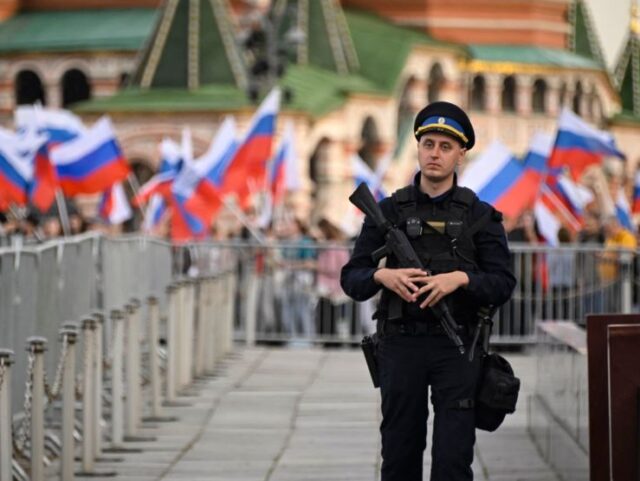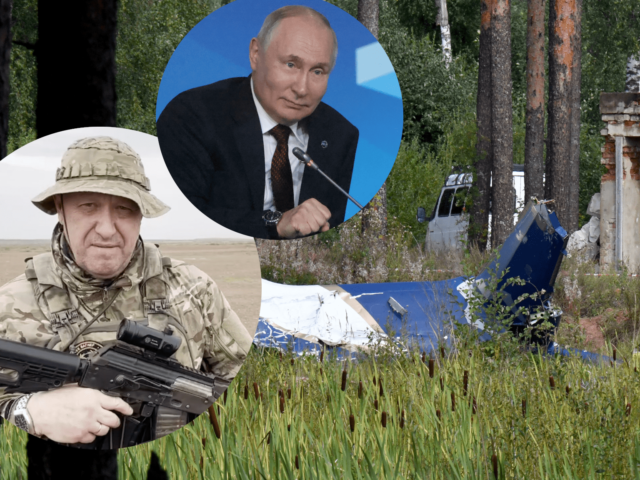AND THE NEXT DAY PRIGOZHIN'S MERCENARIES WERE FORCED TO PLEDGE A VOW OF LOYALTY TO POISON PUTIN.
Russia Accidentally Doxes Its Own Spies, Undercover Buildings, By Publishing Wrong Documents: Report

An investigative group opposed to the Putin regime claims the Moscow city authority accidentally uploaded a sensitive document listing “special” buildings in the area, inadvertently revealing the locations of military intelligence operatives, safehouses, and undercover buildings.
A 434-page document of “special list” addresses across Russia, meaning they should continue to receive electricity even during power cuts, has revealed the locations of large numbers of sensitive state employees, spies, and hidden government buildings, the Dossier Centre investigative group claims. Among those ‘doxed’ by their own government in the middle of a war are officers of the army intelligence branch GRU (Main Intelligence Directorate), locations of offices of KGB successor the FSB (Federal Security Service), and even newly built border posts near Ukraine, they say.
The document appears to have now been taken down from the website of Moscow City Hall.
As noted in a report of Le Figaro, the Dossier Centre is an investigative project of the outlawed Russian political opposition, and funded by exiled Russian billionaire Mikhail Khodorkovsky. The group says the bumper PDF was uploaded by Moscow’s city government to their own website listing special consumers of electricity to be guaranteed a connection in all circumstances, and most of the content is not secret, as many of the institutions are things like hospitals, police stations, and federal buildings.
Yet other entries in the document reveal “outwardly inconspicuous buildings” harbouring intelligence agencies. Many of these are in ordinary residential buildings, and the detail of the list — the group claims — reveals what may be the true purpose of several mysterious buildings in Russia that have been the subject of past speculation.
Comparing the data with satellite and other imagery, the Dossier Centre concludes that intelligence officers appear to be fond of living or working in historic houses in elite neighbourhoods. In North Ossetia, a Russian Republic in the North Caucasus of Eastern Europe, there are security services outposts on the special list in “almost every village”.
The regular military was also listed in great detail, with the addresses of “headquarters, barracks, communications center, ammunition depot” of some units laid out.
The release of the list, which the Dossier Centre has published in map form, with potential targets ranked by likely priority for a Ukrainian drone strike with blast radiuses around the addresses illustrated, may present a serious security risk to the Russian government — assuming it isn’t itself disinformation. A key feature of Russia’s invasion of Ukraine has become a nightly exchange of attack drones and cruise missiles, with Ukrainian forces enjoying some major deep strike successes with British-made Storm Shadows against strategic targets.
The world was provided with a dramatic demonstration of the potential utility of these missiles last month, after Ukrainian forces landed two of them into the headquarters of the Russian Black Sea Fleet at Sevastopol. While initial claims the admiral in command of the fleet was killed in the attack may have been mistaken, it remains the case Ukraine’s strikes against the building, and two ships in dry dock undergoing repairs, appear to have caused Russia to disperse its fleet across the Black Sea beyond range.
While this move may protect Russian assets, it also protects the Ukrainian mainland from being attacked by those ships, as they have also put themselves out of range. Russia has dispersed some of its fleet to Novorossiysk, a Russian Black Sea port 200 miles east on the far side of Crimea, beyond the Kerch Strait already, and reports now claim it is seeking to move them even further away.
Reuters reported on Thursday that Russia had signed a deal to establish a permanent naval base in Abkhazia, a breakaway region of Georgia. While the fleet would presumably be safe from Ukrainian counter-strikes there, the port of Sokhumi — where a Russian warship arrived last week — is some 390 miles from their normal headquarters.
This dispersal resembles a “functional defeat” for the Russian Navy in the Black Sea, the United Kingdom said this week, a situation where most ships were still afloat, but were no longer able to meaningfully engage in combat operations.
Putin Claims Wagner Chief Prigozhin Accidentally Killed Himself By Drunkenly Playing With Grenades on Flight

Russian President Vladimir Putin suggested on Thursday that Wagner private army boss Yevgeny Prigozhin and his men died when, while probably drunk and high, they accidentally set off a grenade during a flight that exploded and killed all on board in August.
Putin has blocked international investigators from examining the wreckage of the flight; his claims were based on a Russian government assessment of the remains of the plane.
Yevgeny Prigozhin – the long-time Putin ally who led one of the world’s largest and most active private military companies and who turned his army from the war in Ukraine to march to Moscow in protest, he said, at mismanagement at the Ministry of Defence – reportedly died in August in a plane crash over Russia. Observers, including Ukrainian President Volodymyr Zelensky, began to suggest almost immediately that the crash was not an accident, but a mopping-up operation against the leaders of the mutiny by the Putin regime. Some suggested an anti-air missile and planted bomb aboard destroyed the plane.
Putin, speaking in Moscow on Thursday, claimed he had been briefed by the “head of the Investigative Committee” and blamed Prigozhin himself for the crash based on the evidence they provided him.
The Russian President claimed it was “established fact” there was no external impact on the plane – exonerating himself from a missile attack on his rival’s plane if true – and that hand grenade fragments “were found in the bodies of those killed in the crash.”
Making implicit the view that those onboard had accidentally killed themselves by playing with a live grenade while under the influence of alcohol and drugs, Putin expressed his regret the investigation team had not taken the time to do a toxicology screening on the remains of the deceased to “determine whether alcohol or drugs were present.” Implying they were drug users, Putin said “we all know” the security services “found five kilograms of cocaine in the company’s office.”
“That’s all I can say,” Putin reportedly concluded.
While these fresh claims may be contested internationally, ultimately they cannot be easily disproven as Russia blocked an international investigation into the crash and conducted its own private inquiry. Prigozhin’s jet was a Legacy 600, made by Embraer in Brazil – meaning the Brazillian government could have joined the investigation and collected its own evidence, but could only have done so if invited by Russia, it was reported at the time.
British newspaper The Times of London reports the remarks of a former Wagner group commander who knew Prigozhin and his deputy Dmitry Utkin, who was also killed in the crash, saying he had never “noticed any signs that [Prigozhin or Utkin] used drugs. And neither of them drank.”
A period of speculation over who may have been behind what was called an assassination of Prigozhin followed the crash of the Wagner leader’s jet in August. Some Western nations, including France and the U.S., directly blamed the Kremlin, a move which received a sharp rebuke from a Chinese propaganda outlet that accused the West of “cognitive warfare” attempting to discredit Putin by “disrupting Russia’s internal unity and stability”.
Weeks after the crash, the Kremlin conceded the crash may have been deliberate, but nevertheless said it would not permit international involvement in the investigation.
No comments:
Post a Comment